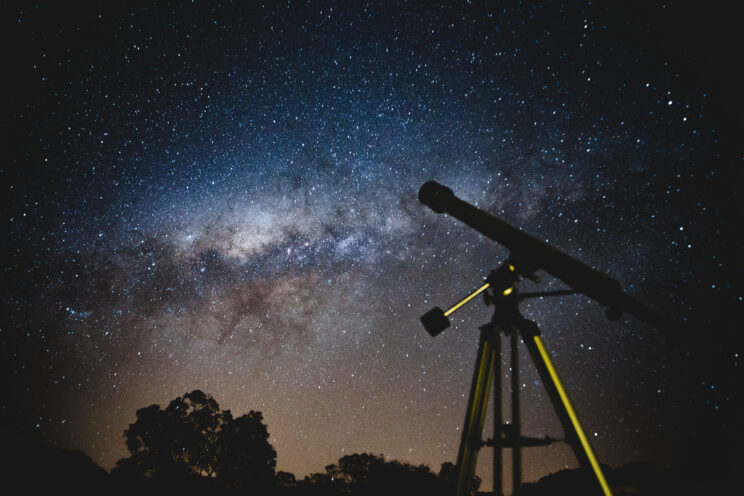
Early in my academic career, I spent several months intensively studying Scripture to determine how I would view my vocation as professional scientist. The conclusions I drew from this process have stayed with me and have helped shaped my career for decades. I recommend this process for anyone regardless of their particular vocation. The earlier in their career they undertake this exercise, the better—but it is never too late.
As a result of my reflections on Scripture, I have settled on four primary ways of being a faithful presence in my chosen field:
First, as a scientist, I engage nearly every day in the process of “thinking God’s thoughts after Him” (to quote Johannes Kepler). As an astronomer, studying the cosmos that God has created provides endless opportunities for worship (cf. Psalm 19). In my experience, astronomy provides one of the more direct ways of gaining insight into the awe-inspiring grandeur, mystery, and power of our Creator, but I have no doubt that the pursuit of myriad different professions—from paleontology to poetry to pottery—could provide similar insights.
Second, every vocation consists in working productively toward something bigger than oneself, though my career has largely been within the narrow confines of academia. But regardless of how big or small the field of my labor is, the resources I obtain as a result of my work (especially the financial resources) allow me to support myself and my family. And the contributions I make to my academic institution allow it to continue its research- and education-focused mission as well. In essence, I see productive work that mirrors God’s creative work as one of the best ways to “Be fruitful’ fill the Earth, and subdue it” (Genesis 1:28).
Third, my vocation provides very specific ways for broader social impact. As far as academic research goes, astronomy is not as directly impactful as, say, attempting to cure cancer. But fundamental research of any sort is part of the overall process of stewarding the Earth and its resources for our benefit, and astronomy provides inspiration for countless potential scientists to pursue STEM careers (for more in-depth thoughts along these lines, see NASA scientist Dr Stuhlinger’s letter written in 1970 to Sister Mary Jucunda, now titled “Why Explore Space”). Of even broader impact, popular-level astronomy is an excellent tool for improving the scientific literacy of the general populace – especially when critical thinking skills are so sorely needed to address issues of public policy, illustrated in the recent contentious public discussions of expert claims (and counter-claims) in the field of epidemiology. Furthermore, even though my direct sphere of influence is relatively small (my institution employs less than 200 people), I can use that influence to address some injustices present in our broader society (e.g., the misogyny that potentially leads to underrepresentation of women in STEM). For example, I recently played a role in the hiring of a female colleague into a senior position, and our regular interactions often give me the chance to support her in this new role. I have also had the privilege to serve the broader scientific community by, for example, being a member of the American Physical Society’s Committee on the International Freedom of Scientists.
Finally, my vocation allows for opportunity to develop deeper relationships with colleagues and students in my own institution and across the world. Interpersonal skills were definitely not a focus of my university or grad school training as a scientist, but I use them even more now as the leader of a large and diverse group of scientists and engineers. As I manage this group’s tasks, contribute to the long-term strategy of my organization, and support my staff in their chosen vocations, I see myself as a shepherd, albeit in a secular setting rather than in a church. While this is not precisely fulfilling Paul’s admonition in Ephesians to “Prepare God’s people for works of service”, I do have analogous responsibilities for the organization’s (and its employees’) flourishing. For example, at the start of the pandemic, I had the opportunity to develop and enact policies that kept our people employed and productive. We ceased some of our research and educational activities for a time, but our leadership nevertheless decided we’d keep *everyone* employed (if they wished to stay). An organization that makes its people (rather than financial profit) a priority has values that are consonant with my own moral views, and therefore I hope to continue to support such an institution for as long as I am able.
In conclusion, my study of God’s word has shown me several ways to be a faithful Christian while pursuing a career as a scientist, from learning about God’s creation that directly inspires worship of Him, to faithfully providing for the people and institutions closest to me, to uplifting my colleagues (directly) and broader society (indirectly). Whether I am consciously thinking of these larger, more “spiritual” goals in any given instance, they nevertheless have motivated me to be a faithful presence over many years within my chosen vocation.
Kyler Kuehn is the Director of Technology at Lowell Observatory, a private astronomical research and educational institution in Flagstaff, AZ. He received his PhD in experimental astrophysics from the University of California Irvine, and subsequently worked at the Ohio State University, Argonne National Laboratory, and the Australian Astronomical Observatory, before moving to Flagstaff with his wife Rebecca and their 3 children. At Lowell, Kyler oversees the Observatory’s science telescopes and related equipment while actively pursuing both observational and instrumentation research.

Leave a Reply